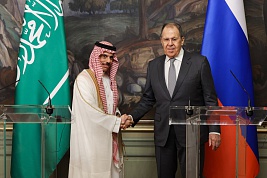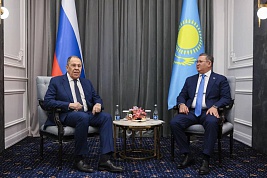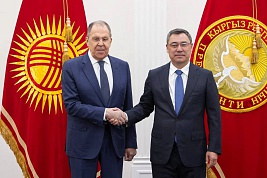Presentation and answers to questions from the mass media by S.V.Lavrov, Minister of Foreign Affairs of Russia, during a joint press conference summarizing the results of negotiations with E.A.Idrisov, Minister of Foreign Affairs of the Republic of Kazakhstan, Moscow, 25 January 2013
Ladies and Gentlemen,
We conducted valuable negotiations with my colleague Mr. E.A.Idrisov, Minister of Foreign Affairs of the Republic of Kazakhstan which took place in the traditionally friendly and trustworthy atmosphere that strategic partners and allies like Russia and Kazakhstan have. Our interaction in all fields is developing dynamically. We have established that there is enormous benefit from regular meetings of our chiefs that sound a keynote for work in all directions. The political dialog is also intensive on other levels, including chiefs of foreign services.
The approval of the Joint Operating Plan for 2013 – 2015 by the Presidents of Russia and Kazakhstan on 19 December 2012 was very high level evidence of the general interest and readiness of our countries to continue convergence and integration. The expansion of regional relations is certainly also recognized by us as one of the most significant components of the practical results we achieve in the commercial, economic, social and other spheres. In September 2012 the IX Forum of Interregional Cooperation of Russia and Kazakhstan took place in Pavlodar, where government chiefs were present. This year we plan to convene the same forum in Yekaterinburg.
Today we discussed issues of the preparation of the Treaty on good neighborly relations and an alliance of Russia and Kazakhstan in the XXI century that we plan to enter into this year, as ordered by Presidents V.V.Putin and N.A.Nazarbaev. The document is future-oriented and is designed to bring the interaction between Russia and Kazakhstan to a new level of quality.
Our attention was focused on different aspects of cooperation in integration associations – within the framework of the Customs Union and the Common Free Market Zone, EurAaEC and CIS the objective is to form a Eurasian Economic Union by 1 January 2015. We are aware that the success of the Eurasian integration project greatly depends on the co-ordination efforts of our countries. We agreed to constantly pay attention to these issues. We exchanged views about further ways of CSTO capacity building. We valued very highly the presidency of Kazakhstan of the CSTO in 2012 that led to the adoption of a range of important and practical result-oriented documents at the summit last December.
We interact closely in regional and international affairs in the UN, the OSCE and other structures. Today we examined closely the regional agenda, including the situation in Central Asia in the context of events in Afghanistan and Afghanistan-related events. We have compared our opinions – and we are of the same opinion – about further development of the Shanghai Cooperation Organization.
The Plan of cooperation measures signed today by and between the Ministries of Foreign Affairs of Russia and Kazakhstan is a packed and specific document. I am convinced that it will provide an additional impulse for the interaction of foreign services of both countries.
I thank my colleague and give him the floor.
Question: Could you please specify what the official note of Russia was about – the note that was sent to the Embassy of the Republic of Kazakhstan in the Russian Federation after this country took the decision to scale back the number of launches of "Proton" space launch vehicles from the Baikonur space launch complex in 2013? What is the official position of Russia in this issue? Did you manage to smooth out disagreements during today's negotiations?
S.V.Lavrov: I would not talk about disagreements or about any special meaning of our correspondence over the note. We correspond regularly on a whole range of issues that inevitably occur when you have a great deal of cooperation between Russia and Kazakhstan. This interaction also includes the space sector, primarily the use of the "Baikonur", space launch complex that is traditionally one of our main priorities. During their meeting in Moscow on 19 December 2012 the Presidents of Russia and Kazakhstan confirmed the importance of this interaction and the need to continue development of "Baikonur" as a critical object of our cooperation and a symbol of partnership and alliance.
When such an enormous economic and industrial site is operated daily, some issues certainly occur and need to be resolved. There were also questions about the number of launches. They are related to the concern of Kazakhstan about the environmental consequences of these processes. The Russian side does everything that is required to improve the environmental aspects – and uses modernized "Proton-M" rockets. This is not the first year when we additionally coordinate the number of launches.
Therefore, in this case I see nothing sensational here – it is just a work aspect. The presidents of our countries understand the need to regulate all the situations of this kind. They made a decision to create an independent Intergovernmental Commission for the "Baikonur" complex. Such a commission has been created, and from our side it is chaired by Mr I.I.Shuvalov. Today we have agreed to proceed from the need to continue constructive work on the whole range of issues related to the use of the "Baikonur" space launch complex, certainly guided by the orders of our Presidents and the decisions we made together at the level of governments and space agencies.
Question: Could you please specify why the information about the note appeared in the mass media?
S.V.Lavrov: I do not know who published this note in the mass media. We use note correspondence to ensure a standard form of diplomatic relationship. I do not know who published it, or permitted a leak. I think these were people wishing to make a mountain out of a molehill.
Question: This year Russia is President of the "Group of Twenty". Will the agenda of the summer summit include the issue of regional integration processes in the CIS area? Will leaders of CIS countries be invited to the summit?
S.V.Lavrov: The summit of the "Group of Twenty" will not be convened in the summer, but in September. We proceed from the need to ensure the succession when preparing for it. The "Group of Twenty" is valuable, because it develops the initiatives that shall then be understandable and acceptable for the rest of the countries. The "Group of Twenty" cannot decide for all. Its decisions are in any case reported through universal multilateral mechanisms such as the IMF and the World Bank. We also need to cooperate with the UN more actively. Succession is very important in this work.
During the Russian presidency special attention will be paid to the creation of additional conditions for the extension of investments, measures that would allow the creation of additional employment, and issues of sovereign debt and their solution without significant shock to the global economy. One of the most significant issues the forum has dealt with from the very first summit is reform of the international monetary and financial system. Decisions were made, but they have been only partially implemented. With our BRICS partners (all of them are members of the "Group of Twenty") and other fellow-thinkers we will enforce the implementation of all decisions regarding reform of the international monetary and financial system. They concern the first stage of reform; subsequent stages of the reform of the international monetary and financial system are still to be agreed on.
According to tradition, countries which are not permanent members of the "Group of Twenty" are invited to its summits. We also would like to pay special attention to the issues related to Eurasian integration in the context of the increase of integration processes in general and their role in the development of the global economy. This trend is widespread, and our region is not excluded. Furthermore, we consider that in our region these processes are the most intensive, and, I hope, the most successful, ones.
As to the specific list of invitees, this will be discussed by the President and his colleagues from the "Group of Twenty". I am convinced that the list will be sufficiently representative.
Question (to E.A.Idrisov): Could you please comment on the transition of the Kazakh language from the Cyrillic alphabet to the Latin alphabet? Isn't it a signal for the change of geopolitical interests of the Republic of Kazakhstan?
S.V.Lavrov (adds after E.A.Idrisov about the possibility of transition of the Russian language to the Latin alphabet): We will not replace the Russian alphabet with the Latin alphabet, not least because it does not have letters "ё" and "й". My colleague is absolutely right in speaking about A.V.Lunacharski and the dawn of the Soviet system. In fact, the Latin alphabet was introduced in Kazakhstan in Soviet times in 1929, and the Kazakh language used it till the 1940s. We all have heard the statement of the President of Kazakhstan that this decision in no way signifies a change of geopolitical preferences.


